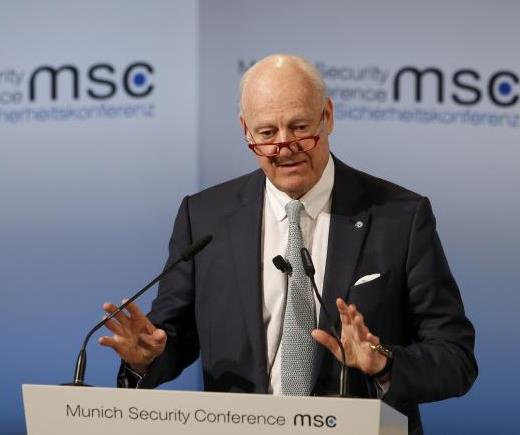 There is no longer unhealthy interest and agitation around the Geneva talks. Speculation and media manipulation have significantly decreased, enabling negotiators to concentrate more on negotiations than on popping cameras. No one expects a breakthrough from Geneva IV, but then it depends what is considered a breakthrough.
There is no longer unhealthy interest and agitation around the Geneva talks. Speculation and media manipulation have significantly decreased, enabling negotiators to concentrate more on negotiations than on popping cameras. No one expects a breakthrough from Geneva IV, but then it depends what is considered a breakthrough.
It is significant that for the first time in almost six years of bloody and devastating war, the government and inclusive opposition are ready for direct talks. Even though UN envoy Staffan de Mistura says he sees little common ground between the sides, the fact that they have matured to the point of overcoming mutual hatred and talking directly is promising.
Another positive sign is that thanks to the efforts of many players — including Russia, Turkey and Saudi Arabia — the opposition has reached the fourth round of talks more united than ever, and able to articulate its positions and demands without stalling each time due to internecine debates and disputes. Despite having little common ground, the sides seem keener on ending the war, concentrating on a political transition and fighting extremists.
Even Turkey, which had staunchly supported the opposition forces from the start of the conflict, has softened its position on the Syrian regime, admitting it is no longer realistic to insist on a solution that excludes President Bashar Assad. The fact that tough preconditions from the opposition side have disappeared from their political statements is also an important and promising sign. Removing a military solution to the conflict is a true breakthrough.
Much was done to make these achievements possible by Turkey and Russia after their own reconciliation. The Astana format, which served to back up the Geneva process, harmonized negotiations and enabled the possibility of direct talks.
The main problem is the ground forces that are not interested in a settlement of the conflict. These radicals and extremists are profiting from it. Jabhat Fateh Al-Sham, formerly Al-Nusra Front, is a major headache. Its infiltration of opposition ranks hampered Russia-US talks on the separation of radical groups and moderate opposition in east Aleppo. This paralysis led to rebel defeat in east Aleppo, which was a game changer in the conflict, at a high cost in human lives that could have been avoided.
Peace in Syria is not in the interests of extremist groups. For Daesh and other terrorists, the longer the conflict, the easier it is to radicalize and recruit. These groups could not survive in peacetime.
At the Munich Security Conference, De Mistura outlined the challenges the political process is facing, and provocations from parties that are playing spoiler. Players such as Russia and Turkey, which stand out as guarantors of the peace process, are working to elaborate mechanisms to minimize the impact of provocations and maintain the cease-fire, which is indispensable for any political process.
It is high time for Syrians to come up with a political settlement to end the violence, chemical attacks, atrocities and suffering. It is high time for the international community to join forces to help them do so.
Geneva IV will not result in breakthroughs that will immediately lead to a political process, but it could pave the way for such agreements. The political maturity of both sides gives hope for further involvement of civil society in negotiations, which will facilitate talks and an indispensable political transition.
International players should stop playing geopolitical games on the bones of innocent Syrians. The longer a political settlement is questioned by negotiating sides, and the longer the Assad regime listens more to Tehran than to Moscow, the stronger terrorist cells will become, and the harder it will be for the international community to fight them. The future of Syria and the world is at stake.
However, the start of a political process is no guarantee of peace. The devil is in the details, and disputes over many issues can lead to the continuation of the conflict in different forms. But no matter the risks and challenges, it is time for all Syrians to work together and remember that they are one nation, and that the key to peace lies only in their hands.
Article published in Arab News:
http://www.arabnews.com/node/1059851












